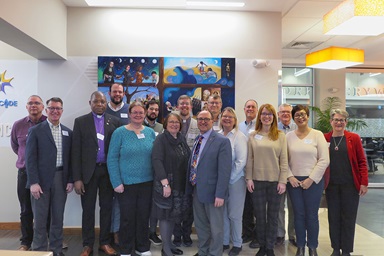Key points:
- The United Methodist Judicial Council addressed the question of what the postponement of General Conference means for legislation deadlines.
- The ruling is one of two decisions released as the church court continues working through its docket.
The United Methodist Church’s top court ruled that any postponement of General Conference resets the submission deadlines for proposed legislation.
The Judicial Council ruling comes as the Commission on the General Conference is considering whether the international lawmaking assembly — already twice postponed by the COVID-19 pandemic — needs to be delayed again.
The commission plans to decide by the end of March whether General Conference can go forward as scheduled on Aug. 29-Sept. 6 this year in Minneapolis. The commission next meets Feb. 24.
Ahead of that meeting, the Judicial Council said the General Conference commission “erred in using the original date as point of reference for the submission deadlines.”
The deadlines for General Conference petitions set out in the Book of Discipline — the denomination’s law book — “are based on the date of the postponed General Conference and reset with each postponement,” the church court said in Decision 1429.
The ruling is among two decisions that the Judicial Council released Feb. 22 as it continues to work through a 22-item docket. The church court previously released six rulings related to a new church law that allows congregations, under limited conditions, to leave the denomination with property.
In Decision 1429, the church court addressed questions brought by the Alaska Conference related to Paragraph 507 in the Book of Discipline.
The paragraph says petitions can be submitted until 230 days “prior to the opening session of the General Conference.” The paragraph also allows annual conferences to submit petitions up to 45 days “prior to the opening session.” A petition is a request to the General Conference for official action on a topic or issue, similar to a bill before the U.S. Congress.
After General Conference’s initial postponement, the commission announced that it was holding to the original petition deadlines for the 2020 General Conference.
That meant the commission would treat all petitions filed after Sept. 18, 2019, as late unless submitted by an annual conference. Any annual conference legislation arriving after March 21, 2020, also would be deemed late. Whether General Conference would consider later-arriving petitions would be at the discretion of the Committee on Reference, a bishop-appointed group of 24 delegates that typically meets the day before General Conference.
Under that interpretation, legislation submitted Jan. 8, 2021, by the Alaska Conference delegation to General Conference would be late. The Alaska delegation’s petition — titled “Christmas Covenant Combined with Wespath Provisions and Protocol” — amends, deletes and combines parts of other legislative proposals previously submitted to General Conference.
Based on the Discipline’s text, the Judicial Council determined that the Alaska delegation had submitted the legislation “in a timely manner.”
The church court directed the General Conference commission “to process all petitions duly submitted by the Alaska Delegation and bodies other than annual conferences between September 19, 2019 and January 11, 2022 in a manner not inconsistent with this holding.”
Before the Alaska Conference made its request for the court’s declaratory decision, the Alaska delegation itself made a similar request about petition deadlines.
However, in Decision 1428, the Judicial Council ruled that an “annual conference delegation to General Conference, jurisdictional, or central conference is not a body authorized” to ask for a declaratory decision.
For that reason, the Judicial Council ruled on the Alaska Conference request instead.
Hahn is assistant news editor for UM News. Contact her at (615) 742-5470 or [email protected].To read more United Methodist news, subscribe to the free Daily or Friday Digests.




